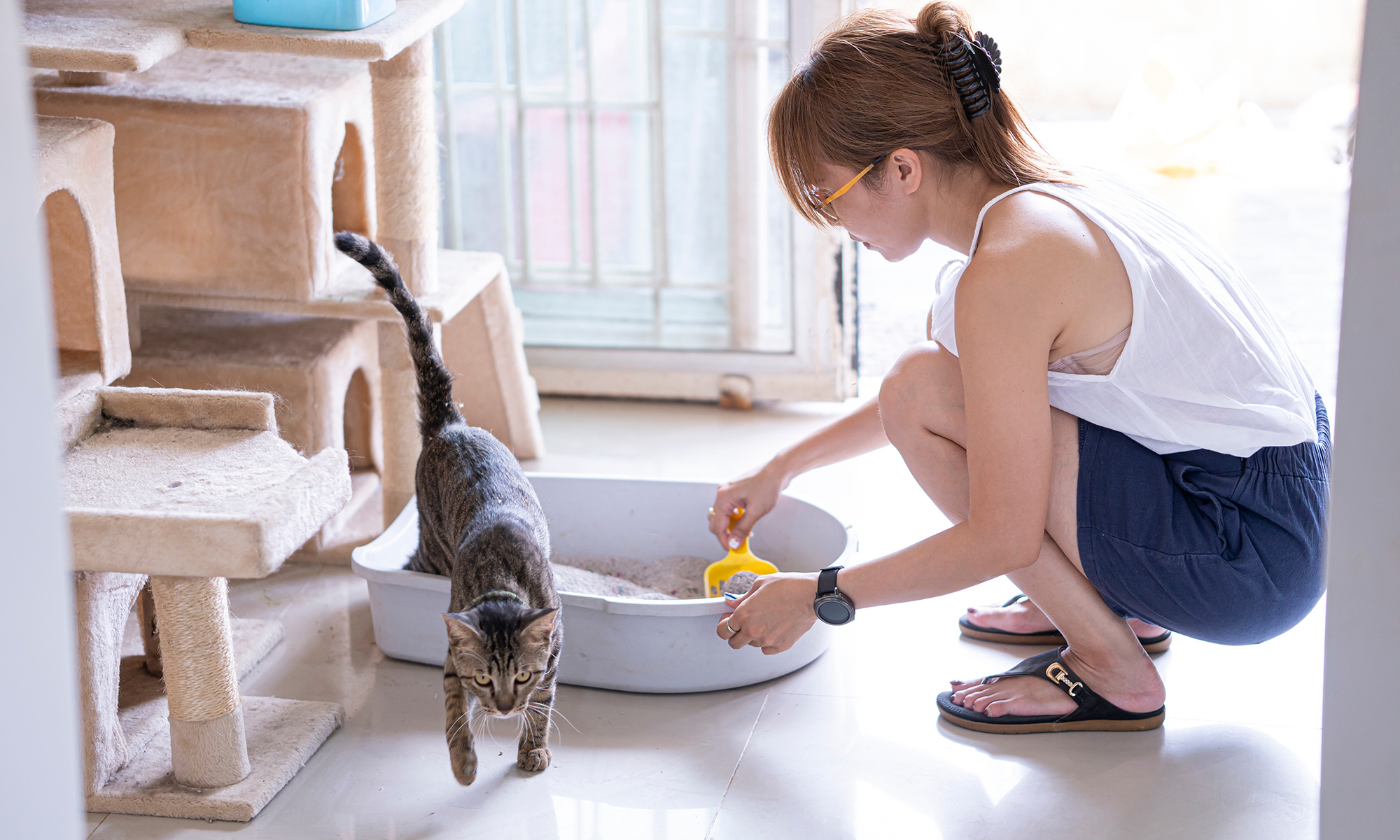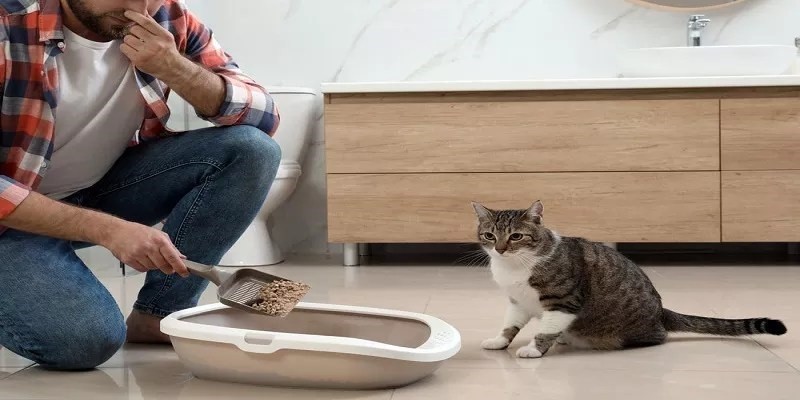Last Updated on January 14, 2025 by Pauline G. Carter
Yes, cats can make your house smell due to their urine, feces and dander. Cat owners can take steps to prevent or reduce odors by regularly cleaning litter boxes and grooming their cats.
Cat owners often love their pets unconditionally, but one of the downsides to living with cats is the potential for unpleasant odors. The primary culprit behind the smell of cats in a home is their urine, feces and dander. When not cleaned up properly, these can linger and create an unpleasant odor.
Additionally, cat owners should be aware of the presence of litter boxes in their homes, as these can also contribute to unwanted smells. While it may not be possible to completely eliminate cat odors, there are steps that cat owners can take to reduce them. Regular cleaning of litter boxes and grooming of cats can help prevent odors from becoming overwhelming.

Credit: skooncatlitter.com
Factors That Cause Cat Odor In Your House
As much as we love our feline friends, there is no denying that cat odor can become an issue in our homes. Factors that contribute to cat odor include litter boxes, cat urine and feces, cat food, cat fur and dander, and cat marking behaviors.
In this section, we’ll explore each of these factors in more detail and provide tips on how to manage and reduce cat odor.
How Litter Boxes Can Cause Odor Issues
Litter boxes are the primary cause of cat odor in the house. Here are some ways they can contribute to the problem:
- Litter boxes that are not cleaned regularly can develop a strong ammonia odor. This can be unpleasant for both you and your cat.
- Some litter types can cause a stronger odor. For instance, clay litters can produce more odor than natural litters.
- Using covered litter boxes can trap odors inside, making them much worse.
Here’s what you can do to manage the odor from litter boxes:
- Clean the litter box at least once a day. Scoop out the solid waste and clumps of litter, and replace with fresh litter.
- Use an odor-neutralizing litter to help reduce the smell. You can also add baking soda to the litter for an additional freshening effect.
- Avoid covered litter boxes as they trap odors. Instead, use open ones and place them in a well-ventilated area.
How Cat Urine, Feces, And Cat Food Contribute To Cat Odor
Cat urine and feces can produce very strong odors, making them one of the main culprits of cat odor in the house. Here are some ways they can contribute to the problem:
- If left uncleaned, cat urine spots can become a breeding ground for bacteria that emit a strong ammonia odor.
- Cat food can also contribute to the smell. Any leftover food can emit an odor that attracts flies and other insects.
Here’s what you can do to manage and reduce cat urine and feces odor:
- Clean any urine spots immediately using an enzymatic cleaner specifically designed for cat urine. This type of cleaner breaks down the bacteria responsible for producing the odor.
- Scoop the litter box daily to prevent a buildup of feces.
- Dispose of any uneaten cat food as soon as possible.
- Provide your cat with quality food that produces less odor.
Tips On Cleaning Litter Boxes And Managing Cat Urine Odor
Here are some additional tips for managing litter boxes and cat urine odor:
- Wash litter boxes at least once a week with warm, soapy water. Dry thoroughly before adding fresh litter.
- Use a litter box liner to help make cleaning easier.
- Consider using an air purifier to help neutralize any lingering odors.
How Cat Fur And Dander Contribute To Cat Odor
Cat fur and dander are also responsible for producing cat odor in the house. Here’s how:
- Cat fur traps dust, dirt, and other particles that can produce a musty odor.
- Cat dander is a common allergen that can cause unpleasant odors.
Here’s what you can do to manage and reduce cat fur and dander:
- Brush your cat daily to remove loose fur and dander.
- Vacuum carpets and furniture at least once a week to remove loose fur and dander.
- Use an air purifier to help reduce the amount of dander in the air.
Best Practices For Grooming And Brushing Your Cat
Regular grooming is essential for managing cat odor. Here are some best practices for grooming and brushing your cat:
- Use a soft-bristled brush to remove loose fur.
- Brush your cat in the direction of their fur growth to prevent discomfort.
- Give your cat a bath once every 4-6 weeks to help keep them clean and fresh smelling.
How Cat Marking Can Contribute To Cat Odor
Cat marking behaviors such as spraying can produce a strong, unpleasant odor. Here’s how:
- Cats use marking to establish their territory and to communicate with other cats.
- Spraying produces a strong, musky odor that can be difficult to remove.
Here’s what you can do to manage cat marking behaviors and reduce odor:
- Have your cat spayed or neutered to limit marking behavior.
- Clean any sprayed areas immediately to help remove the odor.
- Use a feline pheromone spray in marked areas to deter your cat from spraying.
By implementing these tips, you’ll be able to manage and reduce cat odor in your home, making it a pleasant place for both you and your feline friends.
Prevention And Management Of Cat Odor
Do you love having a furry feline as your companion, but have trouble with the accompanying odor? It’s no secret that cats have a unique smell, and their urine can create a pungent aroma that can be challenging to remove.
However, with some simple tips, you can prevent and manage cat odor in your home. Keep reading to learn how.
Tips For Preventing And Managing Cat Odor In Your Home:
1. Keep The Litter Box Clean And Well-Maintained
The litter box is one of the most common culprits behind cat odor in the home. Make sure you scoop out your cat’s waste daily and empty the litter box at least once per week. It’s also a good idea to clean the litter box with soap and water every few weeks.
If you have multiple cats, make sure you have enough litter boxes for each pet, plus one extra.
2. Choose The Right Type Of Litter
Not all cat litter is created equal, and some types may produce more odor than others. Clumping litter tends to be more effective at controlling the smell of urine, while non-clumping litter does a better job at controlling fecal odor.
Experiment with different types to find the best fit for your cat and home.
3. Try A Litter Deodorizer
If your litter box continues to produce a strong odor, consider using a litter deodorizer. These products will help neutralize the smell and keep your home smelling fresh and clean.
4. Provide Regular Grooming For Your Cat
Regular grooming for your cat is another excellent way to prevent odor. Brush your cat often to prevent hairballs and distribute oils that can produce odor. If you’re not comfortable giving your cat a bath, consider taking them to a professional groomer who can help keep your feline fresh and clean.
5. Use Odor-Eliminating Products
There are numerous odor-eliminating products on the market that can be used to clean carpets, furniture, and other parts of your home that may be holding onto cat odor. Products containing enzymes are particularly effective at breaking down and eliminating pet smells.
6. Maintain Good Ventilation
Good ventilation is essential for keeping your home smelling fresh. Open windows when the weather permits, and consider using fans or air purifiers to improve the air quality in your home.
7. Address Any Health Concerns
If you’ve followed all the above tips and still can’t seem to get rid of the cat odor in your home, it’s possible that your cat may have an underlying health concern. In this case, make an appointment with your vet to rule out any medical issues, such as infections or urinary tract problems.
By following these simple tips, you can keep your home smelling fresh and clean, even with a furry feline in the house. So, go ahead and enjoy the company of your beloved pet, without worrying about any accompanying smells.
Frequently Asked Questions Of Do Cats Make Your House Smell?
Do Cats Make Your House Smell Bad?
Yes, cats can produce strong odors from urine and feces that may make your home smell unpleasant.
Why Do Cats Cause Bad Odors In Homes?
Cats produce ammonia in their urine, which can be particularly pungent. Additionally, feces can smell quite strong.
How Can I Prevent Cat Odors In My Home?
Regular cleaning and litter box maintenance can help keep your home smelling fresh. Consider using air purifiers or odor-eliminating sprays as well.
How Often Should I Clean My Cat’S Litter Box?
Ideally, you should clean your cat’s litter box daily to prevent odors from building up. Empty the litter completely and replace it once a week.
Can Certain Cat Foods Reduce Odors?
Yes, certain foods can help reduce cat odors. Look for brands that offer digestible ingredients and avoid fillers like wheat, corn, and soy. Offering your cat wet food can also help increase hydration.
Conclusion
As we have seen throughout this post, cats can indeed make your house smell. However, with proper maintenance and hygiene, this issue can be easily solved. It’s important to remember that cats are wonderful pets, and their presence in your home should not be limited by concerns about odor.
Investing in high-quality litter and regularly cleaning the litter box can greatly reduce odors. Additionally, regularly bathing and grooming your cat can also make a big difference. If you’re still struggling with the scent of your home, there are also various air fresheners and odor eliminators available on the market.
Ultimately, a little effort and attention can go a long way in ensuring a clean and fresh-smelling home for both you and your furry companion.

